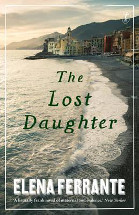The lost daughter by Elena Ferrante

Trans. by Ann Goldstein. Text, 2015, 9781925240139
Recommended for Senior readers. The short novel, almost a novella,
The Lost Daughter is a powerful exploration of some of the themes
Elena Ferrante explores in her Neapolitan Novels series (to
be completed with Volume 4 in October). Set in contemporary Italy it
examines identity, motherhood and the nature of knowledge. When
Leda's adult daughters leave her to live with their father in Canada
she is surprisingly relieved. She pursues the academic career she
has persisted with through the years of child raising, dreads their
phone calls with the demands they always imposed and goes on holiday
alone. While on holiday, relaxing on the beach, she begins to review
her life as a mother, a process in part inspired by her observations
of a beautiful young woman and her demanding child. While lying on
her towel Leda notes the obsessive nature of the relationship, in
its physicality and emotional intensity, which is passed on by the
child to her doll. The doll is of course compliant and pliable and
thus is a more satisfactory child than a real one. Leda begins to
take notice of the pair's family, the mother's gross husband, her
demanding and flagrantly pregnant sister-in-law and a collection of
other relations, all Neapolitan and speaking the Napolese dialect
that still marked her own speech. Her mind turns to her escape from
Naples when she was 18 and her rejection of that part of her life
but which has left its mark on her own accented Italian. A sudden
storm on the beach allows her to steal the child's doll, which she
hides in her apartment, buys clothes for and gruesomely expels a
worm from its body, an act that is comparable to aborting a growth.
The doll is again an ideal child, unlike her own daughters, a child
that accepts attention but doesn't demand or distract, a child whose
sexuality can be controlled. Leda by chance becomes friendly with
the child's mother who expresses her admiration for Leda's learning
and grace, until she reveals the doll. Screaming in vicious dialect
the mother tells Leda that her books and learning mean nothing
before shockingly assaulting her. In the end an act of cheerful
acceptance, a sign of love, from her daughters restores balance to
Leda's life, and the reader is left with the understanding that this
love counts for more than the challenges that the children have
caused. Ferrante is concerned with the complexity of being a woman,
a mother and a daughter, and the power of upbringing, as well as the
limited effect of education. She asks how much can learning, reading
and knowing literature moderate the effects of the dilemmas of
motherhood? This powerful novel is recommended for older readers.
Jenny Hamilton